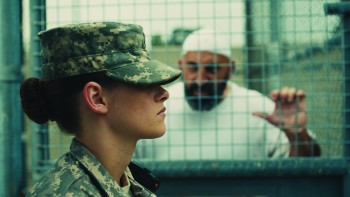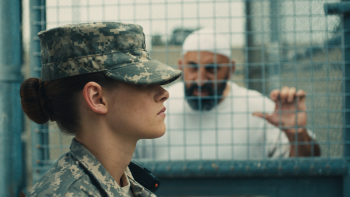Peter Sattler Talks About Kristen “It was the script and David's involvement that got Kristen interested,” he says. “She took a huge risk, jumping on to this movie with a director who hadn't directed a feature, but I think she responded to the power of the script.”
------------------------
Knowing that many first-time directors stumble with style over substance, Sattler opted to shoot Camp X-Ray as “a very classic, very elegant film” that let the script and performances do the talking. So it wasn't until he met with Stewart and talked through the character of Amy that his vision began to coalesce. “The weird thing about Kristen is that there's Kristen Stewart the star and Kristen Stewart the actor,” he says of his lead. Together, they started asking questions that acted as foundation for the film's main action. Sattler rattles off examples: “Who is this girl? She didn't do that, she did this. OK, what did she do in high school? Was she involved in sports? Was she a virgin?” He says Stewart filled in many of the blanks and added dimension to the ideas he had put on the page.
Ms. Stewart created word clouds and spoken word poetry as a way to develop her character, says the film’s writer-director Peter Sattler. “I think Kristen and I were both aware of her image and upending expectations for that image. This is a side of her that I don’t think anyone else has seen yet,” he said.
***
AP INTERVIEW: Stewart, who was last at the festival in 2010 when she was promoting her role as Joan Jett in "The Runaways," says "Camp X-Ray" was one of the rare scripts she'd read that made her want to work again after her two-year acting hiatus following the "Twilight" movies.
"At my age it's difficult to find stuff that isn't completely derivative," said the 23-year-old in a recent interview. "Most parts are imitating something else that was popular."
With "Snow White and the Huntsman 2" coming in 2015, Stewart's big-budget franchise days are far from over. "But it's a little bit more difficult to create the environment that I thrive in on a bigger movie," she explains. "I prefer doing smaller ones. They're quicker. I like intensive things and then I like to walk away."
Via @RobstenDreams and @Itsoktobeyouorg
Peter Sattler Interview Q: Can you talk about the casting process and how you ended up working with Kristen, Payman and the rest of the cast?
We started with a Hail Mary to Kristen. It was certainly a long shot, but she was absolutely perfect for the role, so we had to try. Her character requires a lot of acting without words, a lot of living in the moment, and that is something Kristen absolutely excels at. Her character also needed a mixture of toughness and vulnerability which, to me, are traits that she embodies perfectly. So we got the script to Ken Kaplan, her agent, who, much to his credit, sent it on to her, and a few weeks later we sat down to talk about the film. And in that first meeting, I was blown away by her approach to the material, her dedication to the details, and her passion for independent cinema. I think we could both tell that we were pointing in the same direction, so off we went. It all happened pretty quickly by Hollywood standards.
Payman’s a funny story. I adored his performance in the Academy Award winning Iranian film, A Separation, but he was so stern in that role, I didn’t see him as our loud-mouthed detainee. We scheduled a video chat with him in Iran anyway, and the moment he popped up on my screen, everything was different. He was the most buoyant, vibrant man you’ll ever meet, he talked a mile a minute. I loved him, and the fact that he was so different in A Separation just testified to his incredible range as an actor. I remember that night very vividly because I couldn’t get Payman out of my head. I knew that he had to be the one.
But first I needed to see what they were like together. The entire movie hinges on their relationship. So we arranged another video chat, and the second they started speaking, it was like they were already their characters. Payman was talking and talking and talking, and Kristen was kind of quietly listening to him, wryly observing, chiming in, Payman would coax a laugh out of her. It was like I was literally watching a scene from the script play out before my eyes. I gave Payman the job right then and there during the phone call. We all knew there was a magical chemistry between the two of them.
I remember the first time I met Lane Garrison, I couldn’t help but notice that he literally had a red neck. We joked about it, but in truth, it’s not insignificant. It helps that he knows the world of a West Texas soldier inside and out, it’s very much the world he came from. But what really makes him special is the kind of sad sweetness and intelligence he could bring out underneath that veneer. THAT was the undertone that I really responded to in Lane, and something he nailed in the movie. I really gravitate to actors who can play two tones at once. It creates such depth.
John Carroll Lynch’s name was brought up by my casting director, Richard Hicks. Now there’s an actor who’s got range. Comedy, drama, lovable, intimidating; he’s a damn chameleon. I really loved watching him bring his colonel character to life. He brought such a wonderful reality to a role that, in the wrong hands, could have been just another military brass cliché. His performance really played into the larger approach we had, which was to make a film with no ‘bad guys.’ Characters can do bad things, everyone can make bad decisions, but we need to understand, and to some degree sympathize with, why they’re doing what they’re doing. Everyone has an opinion, and if you took the time to talk to them about it, you’d probably find a reason or two to agree with them. And John really understood that, and really worked hard to show the other side of the military’s thinking.
Q: What was your favorite scene to write, and what was your favorite scene to shoot?
I most enjoyed writing the scene that inspired the entire film: the first exchange over the book cart. It is the scene where Kristen and Payman’s characters first meet. We open the movie as a young woman enters the detention camp, which is, understandably, a very intense and frightening place. But when she first meets Payman’s character, we are given a very surprising moment of levity. It underscores the surreal duality of this place and these characters, where one moment you can be literally fighting for your life, but the next, you find yourself arguing with a detainee over Harry Potter.
I also just loved the idea of doing a movie about Gitmo, but not focusing on torture or politics and instead writing scenes about the stupid little things. These two sides are set up to be antagonistic to each other. It’s unavoidably engineered into their relationship. But they can’t fight a real war, so instead they fight it through these little idiosyncratic battles. Arguing about what’s on the lunch menu today or about when they’re getting new books. Stupid arguments, but to these characters, they’re supremely important. This is their Bunker Hill. This is their jihad. And I loved writing those scenes because they were an amusing way to illustrate the idiocy of their conflict in the first place.
My favorite scenes to shoot were always the ones with Kristen and Payman. They were, on the whole, the more daunting ones to film because they were big scenes. But every moment, every take that those two interacted had a real magic to it. They would find their own rhythms and create little interchanges. It was always so effortless and natural. You usually have to fight to get a scene on its feet before you can start working it, but with those two, it was always just there, which meant the three of us could focus on shaping and molding that reality instead of trying to bring it to life.
Q: How did you prepare the actors for their roles before production? Was there a rehearsal process?
Kristen and Payman are interesting in that they both work in very different ways.
Kristen really loves intellectualizing her character because she absolutely wants to live in the moment. And to do that, it requires truly knowing your character from the inside out. So we spent a lot of time talking about girls we knew that were like Cole. Really just talking around the character, building out her backstory. Going back and forth about little awkward moments from her fictional life that we felt was the type of girl we were building.
Payman, to some degree, had a similar approach. He would share stories with me about people who knew who had been imprisoned in Iran, and he would invent little rules which he felt defined who Ali was. But what’s interesting about Payman is that he’s an accomplished writer and filmmaker as well as an actor. So he would most often gravitate towards little turns of a phrase, or try and establish very visual reactions or ticks his character could employ on-screen.
I had some time to develop both of these methods with Kristen and Payman separately, but due to Payman’s schedule, we were only able to get him in the states to rehearse a few weeks before shooting. In that time, the three of us spent as much time as possible together. We concentrated mostly on the big scenes. There’s about four or five of them, really long scenes that are the crux of the film. In the first pass, we mostly just dialed in intentions and wants and particular approaches to certain lines. We also auditioned new lines and improvised around the scenes a little to find truth. The script was never sacrosanct; it was always just about getting to the truth of their interaction.
But the most helpful thing we did was actually to go rehearse in the actual prison where we shot. It was here that we worked out the dance of how to play the back and forth of lines as Kristen’s character was patrolling the hallway. What line she said where and how that was going to all work out. As I’ve said before, those scenes are incredibly complicated to stage properly, so it was something we definitely had to work out before hand.
And then, finally, during our last rehearsal at the location, I left Payman in his cell, and had Kristen walk in circles around that hallway for about twenty minutes. We left them there alone to try and get some sense of what it would actually be like to be spend all day stuck there. There’s a very palpable reality to being behind those thick doors, walking those long hallways.
***
Ser' Darius Blain : What was it like working with Kristen Stewart in the film?
Getting the chance to work with Kristen one on one was an amazing experience. She’s one of those people who really knows everything about her character. She’s always prepared, very down to Earth and the consummate professional. She’s so easy to work with.




No comments:
Post a Comment